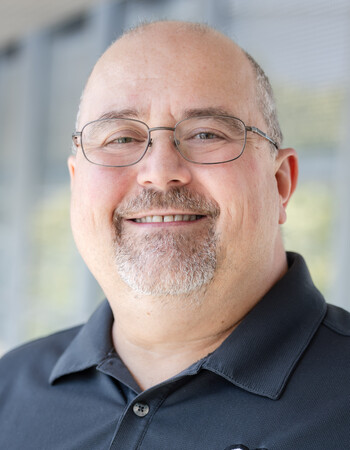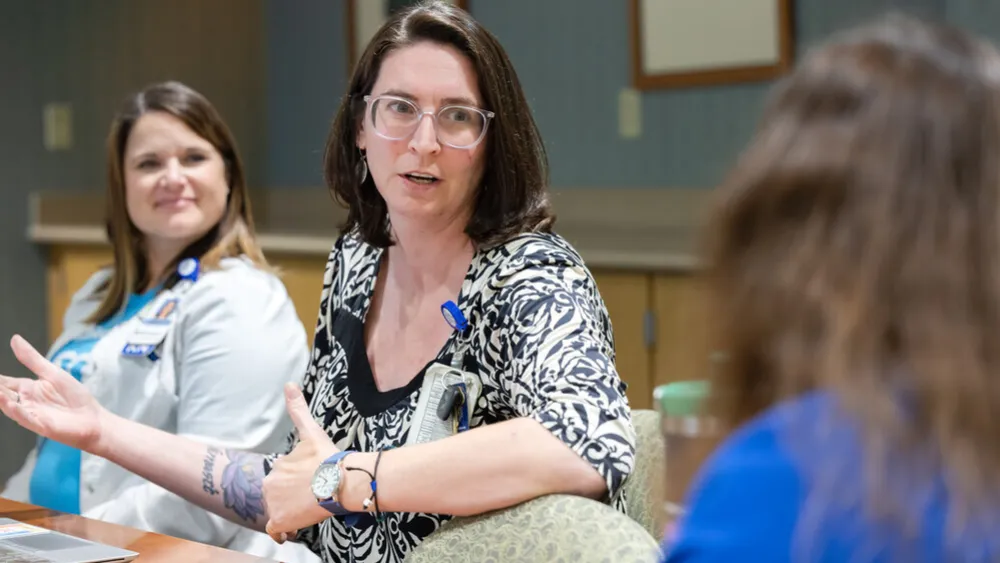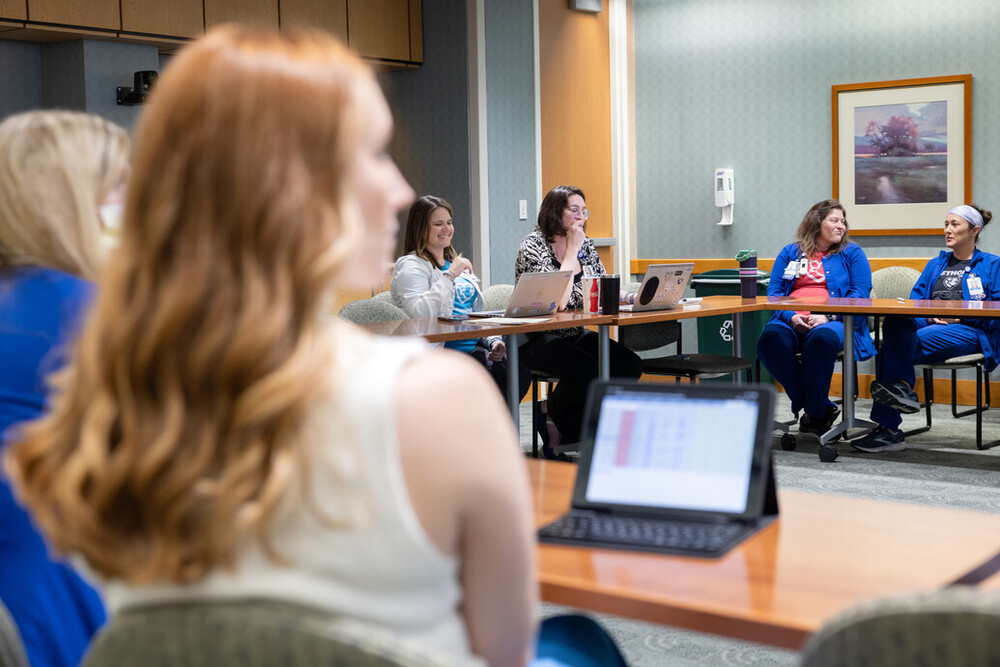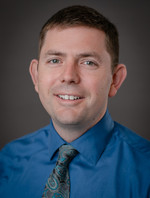
Mental Health
RISE program gives Methodist staffers ‘a relief valve’ after stressful events
Published: Sept. 6, 2024


The call stopped Jeffrey Hildenbrandt in his tracks.
Hildenbrandt was working in the Methodist Health System Customer Service Call Center last spring when his cellphone rang. It was his teenage son’s school, relaying news that he had been suspended after an incident.
“I knew he’d been having a rough week with some stuff going on at school. Every teenager has some rough patches,” Hildenbrandt said. “But this just completely stunned me. My world just stopped.”
Hildenbrandt stared at his computer, his mind “going 1,000 mph.”
“Do I need to leave? Do I need to stay? What do I do? What can I do?” he remembers thinking. “Fortunately, I knew that there was a RISE responder nearby. I went to them and said, ‘I need to talk to somebody. It’s kind of an emergency. Can we do a RISE session?’”

Confidential peer support
RISE (Resilience in Stressful Events) is a nationally recognized program developed in 2011 by Johns Hopkins Medicine to address “second victim syndrome,” a phenomenon where health care workers experience anxiety, depression or other emotions after difficult patient- and visitor-related events. Examples include:
- Challenging medical emergencies
- Situations that challenge their moral beliefs
- Unexpected patient deaths
- Workplace violence, including verbal and physical assaults
Today, 70 organizations have implemented programs based on the Johns Hopkins model. Thanks to funding from Methodist Hospital Foundation and its donors, Methodist became the first health system in the region to offer RISE in December 2023. Currently, the program is available 24/7 to employees at Methodist Hospital, Methodist Women’s Hospital and their hospital-based clinics, and Methodist is exploring opportunities for expansion.
At Methodist, over two dozen volunteer peer responders are trained to take anonymous calls or meet in person, giving their colleagues a timely way to navigate stress in a confidential, nonjudgmental environment.
“We get tense situations that pull at our heartstrings,” said the Rev. Melissa Strong, M.Div., APBCC, who helps coordinate RISE and is the service leader for Spiritual Care and Resilience at Methodist Hospital and Methodist Women’s Hospital. “Codes and deaths. Circumstances when we wish we could do something different. Ethical situations. What we would choose for ourselves isn’t necessarily what a patient or a family would choose for themselves, and that can all create stress.”
Stressors that aren’t work-related, like Hildenbrandt’s, can be just as difficult – part of the “gray area between how our work life affects our home life and vice versa,” said Strong, who works with co-coordinators Sheri Cunningham, MSN, RN, PCCN-K, FAB, service leader for medical observation at Methodist Hospital; and Carissa Nielsen, MSN, RN, NPD-BC, program manager for continuing education at Nebraska Methodist College.
“These situations that people can call for, they happen every single day,” Strong said.

A growing need
When Susannah Black, BSN-RN, OCN, CDP, heard that Methodist’s RISE program was seeking volunteer peer responders, she was immediately interested.
Before becoming a nurse coordinator in the Oncology Unit at Methodist Hospital in 2023, she spent four years as a registered nurse on the unit. She’s experienced the ups and downs of nursing, and in her current role – coordinating care for new patients, discharges and unit staffing – she has more responsibility than ever. With colleagues looking to her for guidance and support, she’s keenly aware of their challenges and the need for a program like RISE.
“Maintaining resilience as a health care worker is very difficult,” she said. “As we’ve noticed coming out of COVID, there are all the staff changes. Patients’ acuity levels look different now than what we were seeing before. Burnout has increased.”
The developers of RISE at Johns Hopkins came to Omaha last year to provide implementation training at Methodist. In November, a developer returned to lead an intensive eight-hour training for Methodist’s volunteer responders.
Each responder is asked to be on call for 24 hours at least two days a month. They also meet monthly for a debriefing and training session where they review how they handled calls, discuss their biases and practice new scenarios. It’s all aimed at encouraging responders to prioritize active listening, reflection and coping skills.
“The goal is to help them feel heard,” Strong said. “It’s not to fix it. The peer responder is taught to not share their own story. If they do share, it’s very intentionally chosen to connect and bring it back to that person.”
“Situations are always going to arrive,” Black said. “It’s not a matter of if, but when. It’s nice to have someone who wasn’t there who can give an overarching perspective for what you have going on. It’s an incredibly important resource for employees.”

Someone to listen
Word is getting out about RISE, with about three calls a month coming in. Even more staff members have approached RISE responders informally to discuss challenges.
Like Black, Hildenbrandt immediately saw the value in RISE when the call for volunteers went out. It reminded him of a Red Cross psychological first-aid course he’d taken, and he thought his perspective could be an asset.
“I get fulfillment out of trying to be useful to other people,” he said. “I’m not a fixer, but I do like to be a sounding board. I was thinking it would be good to have a responder who wasn’t on the medical side.”
Knowing how valuable the program could be, he didn’t hesitate to use it himself when his son’s school called last spring. After his initial shock, he chatted with a responder for about 30 minutes, took a five-minute walk and mapped out a plan for home before returning to work.
“A relief valve – that’s what it felt like,” he said. “I was stuck, and being able to reset myself made a huge difference. I got into RISE because I wanted to help other people. And all of a sudden, I was helped by it.”
That’s why Hildenbrandt recommends the program to anyone struggling after a stressful event.
“Do you need that someone to listen? Not to pass judgment? Someone to ask, ‘Can I talk to you for a second?’ Absolutely.”
Photos by Nick Bohan
More Resources
- Read more from the fall/winter 2024 issue of The Meaning of Care Magazine.
- See how Methodist employees are being recognized for their outstanding care.
- Read more Methodist articles focused on mental health.


